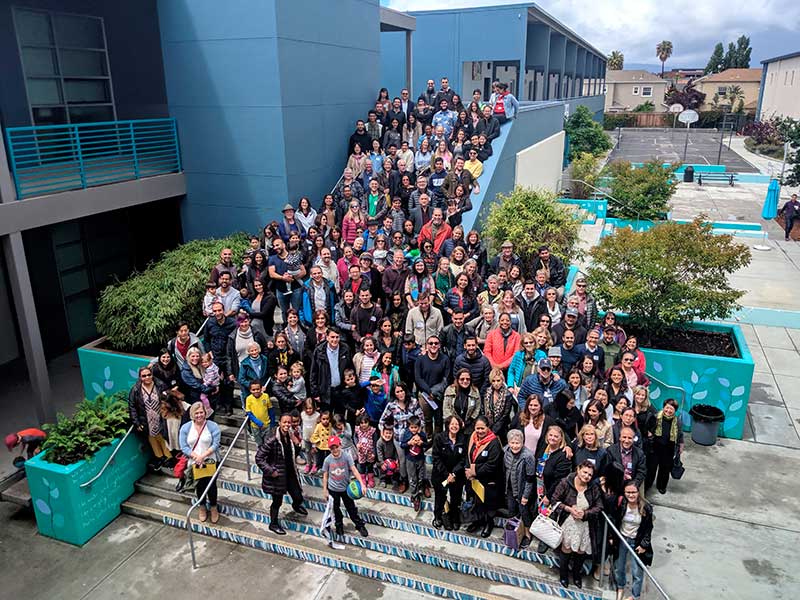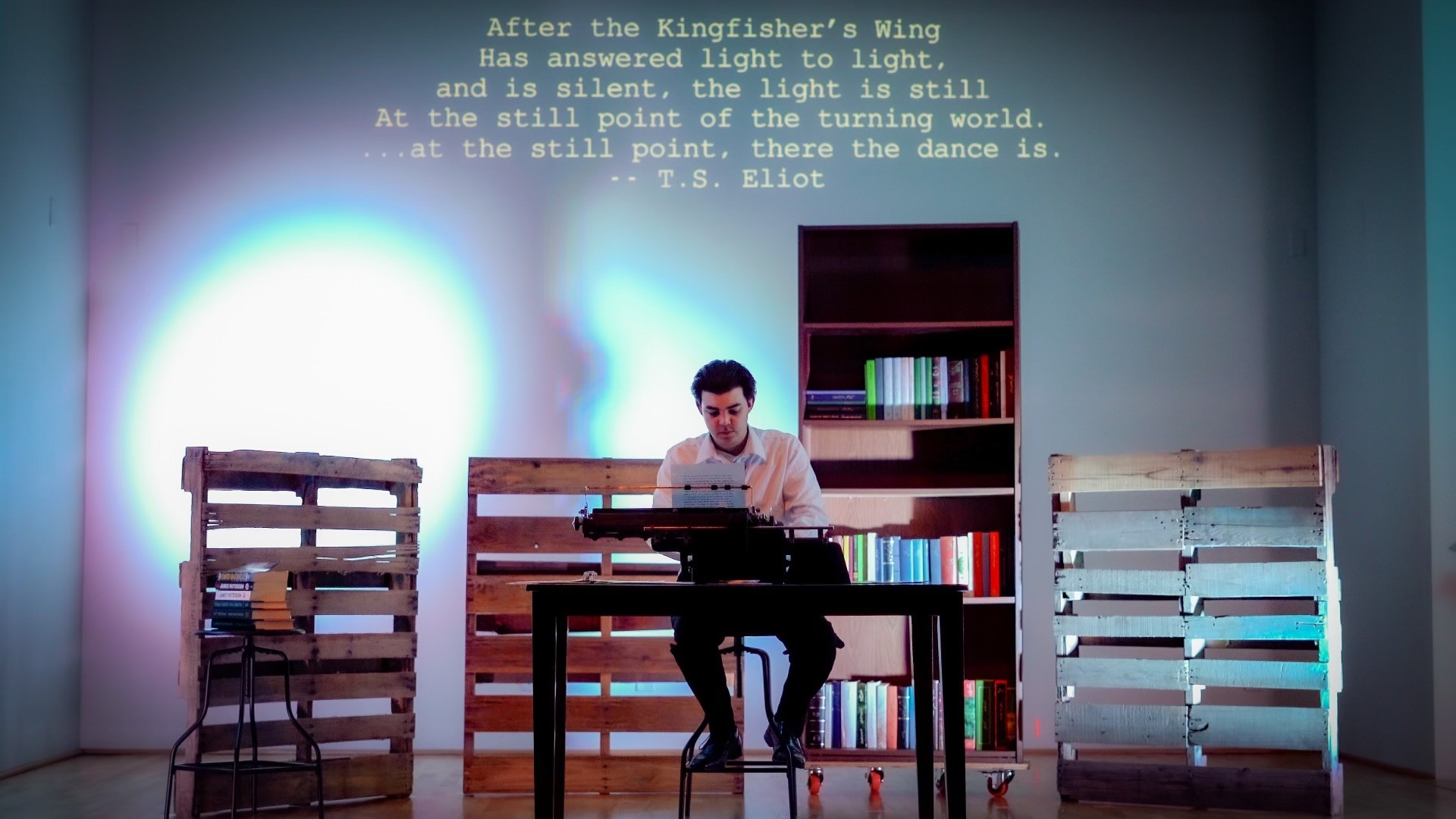
Braving the unknown: faces of homefront pioneering in the U.S.
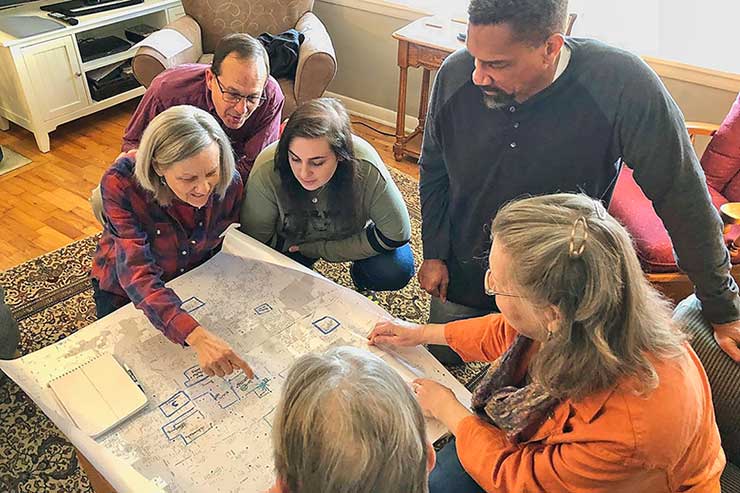
A few profiles of Baha’is who have moved to serve the community-building process as homefront pioneers:
“Right where I was supposed to be”
Kylie Cantrell can point to each juncture that led her to a neighborhood in Des Moines, Iowa.
“It is a long story of how I wound up serving where I am,” she says. “A lot of the time, while living in the moment, things were unclear. But after four years of homefront pioneering, it is all very clear that I wound up right where I was supposed to be.”
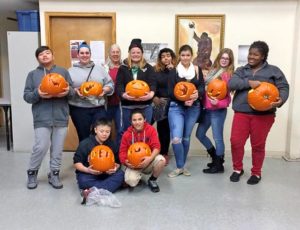
First juncture: July 2013. The international Baha’i community began the first of 114 youth conferences held all around the world. Baha’is where Cantrell lived in southern Oregon pledged to ensure that all youths who grew up in the area, regardless of where they were living at the time, could attend the Baha’i youth conference closest to them. So she was able to participate in the Chicago gathering while she was studying at Northwest Missouri State University.
Cantrell then began thinking about where to serve after graduation the next spring. All five of her college years, few Baha’is lived nearby. “So I was eager to jump into an active community.”
Cantrell also considered service at the Baha’i World Center in Haifa, Israel. Many Baha’is apply to spend a year or more volunteering there.
In January 2014 two emails arrived that brought her to the second juncture. One said there wasn’t a spot for her at the World Center. The other was from a friend in Kansas City, Missouri, asking what she thought about moving to Des Moines.
To Cantrell, the message was clear. She decided to set in motion the idea of serving in Des Moines.
After graduation, her next stop was tiny Ackworth, Iowa, where she lived with a friend from college while plans for Des Moines took shape. Meanwhile, she better prepared herself to talk about and teach the Baha’i Faith by joining an intensive study group in Kansas City.
Call it juncture three. That study, paired with activity in a Kansas City neighborhood, brought home to Cantrell the importance of immediately putting into practice what she was learning. “I got to practice, every single afternoon for 10 days, how to have important conversations with strangers.”
“Sometimes we talked about the Faith, but sometimes we just talked to each other as people living in the same neighborhood and what the needs for the area were,” she reflects. “The fear we often have of talking to strangers was gone. It was no longer an obstacle because of the confidence that the practices had given me.”
Cue juncture four. On a September 2014 flight to Oregon, Cantrell sat next to a man from Des Moines and, “still aglow with confidence,” told him she wanted to mentor young people there, but was unfamiliar with the city’s neighborhoods.
The man knew just where to direct her: River Bend, an already diverse area that is welcoming a lot of immigrants. All well and good. But who would work alongside her? “I wanted to wait to start serving until I had some accompaniment,” she says.
Then a friend in Tennessee sent Cantrell a quote from Baha’u’llah that encourages Baha’is to “put on the armor” of God’s love and arise in service, even if all alone.
That juncture, five, gave Cantrell all the courage she needed. Not that she has been alone at any point since. A number of collaborators have served alongside her in the River Bend neighborhood: a medical student who lent use of his apartment for junior youth group meetings, a man visiting from Bangladesh, the mother of a junior youth, a family from Boone, Iowa, and others.
Since autumn 2014 she has helped start two junior youth groups, as well as two study circles — one in Swahili — with some older youths participating. And Cantrell can say, “We have activity. We have a team. We have plans.”
“I need to be part of this process”
Brently and Elizabeth Donaldson were “schooled” on homefront pioneering through their family’s experience. Two daughters had moved to areas that needed Baha’is to offer core community-building activities.
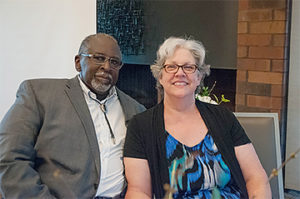
They observed closely as one daughter relocated to a small town near St. Louis after graduation from medical school and a second daughter moved to a Kansas City neighborhood after completing her doctorate.
The Donaldsons also kept up on the ongoing guidance of international and national Baha’i institutions. One daughter helped Brently Donaldson, who has vision issues, by making voice recordings of some of the letters. This enabled him to help Baha’is in his own community of Rolling Meadows, Illinois, study that guidance.
By the time a call was issued to U.S. Baha’is in April 2018 for volunteers to relocate as homefront pioneers, Brently Donaldson was primed.
“At that point I said, ‘What am I doing?’ It’s kind of that simple. They’re asking for homefront pioneers, everything is lined up for me to go, so I need to be part of this process.”
So the Donaldsons consulted together, and with the help of the Regional Baha’i Council of the Prairie States they chose Winfield, Kansas.
Brently Donaldson is from Kansas and had always figured “that I was going to have to go back there and do some work for Baha’u’llah before it was all finished because there are not a whole lot of other Baha’is in the area.”
Too, Brently Donaldson and his sister had already been operating a social and economic development project in Winfield and vicinity for more than 10 years, rehabbing homes in poor neighborhoods and forging a relationship with professionals “from real estate people to lawyers and plumbers and electricians.”
So as he builds community physically through that project, he can build community spiritually through activities in neighborhoods and in a Veterans Affairs facility. He hopes particularly to bring people together through drumming circles with the help of Baha’is from Kansas City.
All the while the Donaldsons follow the roadmap given them by the guidance of Baha’i institutions. “It’s really nothing about me,” says Brently Donaldson. The institutions have “given me the process of what to do and how to do it — how to start approaching the community — and I just want to see where it goes from there.”
“A new adventure”
When Glenn and Linda Nerbak settle in Santa Cruz County, Arizona, they’ll have an instant partner in Baha’i activities: Linda’s 88-year-old mother, Elaine Cross, who is calling her move with them “a new adventure.”
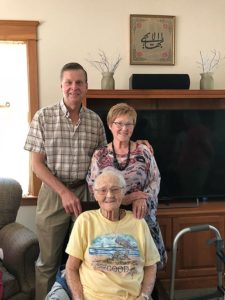
Glenn Nerbak felt an immediate attraction to the area a few miles from Mexico’s border when they traveled there in April 2018 from their home in South Portland, Maine, to visit friends Rick and Jill Moritz.
Jill Moritz mentioned that the nascent Baha’i community-building activity in Santa Cruz County is at the first milestone of development, as defined by the Universal House of Justice, the global governing body of the Faith. Communities there are striving to advance.
That piqued the couple’s interest. Glenn Nerbak, who had worked in Portland schools for 26 years, asked Rick Moritz about teaching jobs in the Santa Cruz Valley school district.
A dive into the district website turned up an opening in Rio Rico for a teacher of seventh-grade social studies — Nerbak’s favorite grade and subject. And soon after dropping off his resume, he received a call from the principal asking him to come in for an interview.
“The people of Maine will miss you; the people of Arizona will welcome you” was the message he received a week later with his job offer.
Linda Nerbak got confirmations as well that they were on the right path. The day after they returned to Maine she saw the April 2018 letter from the National Spiritual Assembly of the Baha’is of the United States asking for pioneers.
She also read a prayer for pioneers composed by ‘Abdu’l-Baha, and was amused and inspired reading the line, “I have no wish save to turn my steps, in my love for Thee, towards the mountains and the deserts, to loudly proclaim the advent of Thy Kingdom. …” Rio Rico has both mountains and deserts close by.
Then there’s Linda’s mother, Elaine Cross, who registered as a Baha’i in May 2017.
“Elaine has taken her enrollment seriously, has a desire to learn, has hosted Feasts and a study circle, and enjoys telling people about the Faith,” say the Nerbaks.
Their home in Maine sold quickly. Their next destination is a Rio Rico neighborhood that is home to three people who have expressed interest in the teachings of Baha’u’llah.
“We hope to add support to the efforts in the area in any way needed,” say the couple.
“Baha’u’llah has His own plan for us”
The first thing Ruth and Ramon Sepulveda did when they moved to Point Comfort, Texas, a coastal town where no other Baha’is lived, was to start a local Fund to pay for Baha’i activities.
Premature? Not to this couple. “Both of us have served as treasurers [for local Baha’i communities] and know how spiritual the Fund is,” says Ruth Sepulveda.
The couple also set a goal, she says, “to be more intentional in our conversations … so that we are having spiritual conversations and not just talking about the weather and the dogs.”
They are off to a great start.
“Ramon and I have already made friends here,” she says. “Our neighbors are friendly. And we have our own goodwill ambassador: Tyson, a 160-pound Great Pyrenees mix dog who loves everyone.
“I met two high school girls yesterday while walking him. We had a great conversation and they promised to visit me often.”

To get activities going, the Sepulvedas put up a flyer announcing regular devotional gatherings on the bay. The first one was specifically to pray for the victims of the Santa Fe, Texas, high school shooting in May.
The devotionals have gone on weekly since then. Ruth Sepulveda’s sister, who is a Baha’i pioneer in Belize, joins in on her visits to Texas.
Their relocation was the answer to a longtime prayer for the Sepulvedas. They also discovered that members of the Regional Baha’i Council of the South Central States, as well as some Texans on visits to Baha’i shrines in Israel, had also prayed for pioneers to move to the area.
For the Sepulvedas, a move was many years in the making, though.
“We were looking for somewhere that we could make an income and find housing,” says Ruth Sepulveda.
“We did want it to be in Texas because I’m certified to teach in Texas and he’s certified as a water and wastewater operator here. Besides, most of our grandchildren live in Texas.”
They looked into several localities that were goal areas for Baha’i community building. But each time Ramon Sepulveda got an employment offer, either the job didn’t come through or it quickly ended. For a while it looked as though they’d be in Austin long term.
Then came an offer to work in Point Comfort. Ultimately, the city hired Ramon Sepulveda to operate its water and wastewater plant. That cinched the deal for Ruth Sepulveda as well.
Not only would they be initiating the first Baha’i activities in the area; as a bonus, another goal area is just 45 minutes away. The Sepulvedas have made plans to join with local Baha’is in visiting people interested in the community-building process.
Teaching positions were available in Point Comfort. “But instead of finding a job,” Ruth Sepulveda says, “I decided to retire and work part time as a substitute and tutor, freeing my time up for Baha’i work.”
Now things are looking up for the Sepulvedas after years of false starts.
“It’s our hope,” says Ruth Sepulveda, “that others who wish to homefront pioneer, and who keep having difficulties block their way, will see our story as an example of perseverance and not get discouraged from their goals. Baha’u’llah has His own plan for us and we need to just keep trying.”
“We are excited about the prospects”
Finding a place to live in December or January can be difficult, as can moving and downsizing.
But James and Linda Braun kept their eyes on the prize — living close to the people they’d gotten to know in a Springfield, Missouri, neighborhood.
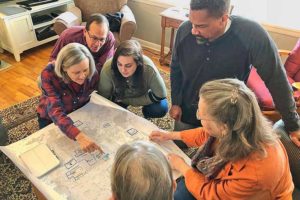
Now they have set their sights set on helping that cluster of communities increase the number of Baha’i-initiated activities over the coming year.
Whenever doubts crept in, the couple would reread a section of the Dec. 29, 2015, message of the Universal House of Justice. They hold that guidance dear, they say, as a “framework for how we are to proceed and an assurance of success” despite “how nascent our efforts are.”
For more than three years up to fall 2017, the Brauns had been traveling about a half hour each way to meet people in that Springfield neighborhood.
“Our initial efforts were of short duration and not very effective,” they say, “but were full of learning about reaching out to the wider community and having conversations about community building, especially the junior youth spiritual empowerment program.”
It was after the couple participated in a seminar in Kansas City “and began to learn about and build the skills of conversing with youth … that we began to have a hint of success.”
Linda Braun found high schoolers interested in being trained to mentor middle schoolers. James Braun launched and facilitated junior youth groups with the help of those high schoolers.
Distance was more and more a problem for the Brauns, though, as were the falling temperatures. Those blossoming activities would soon need a permanent home in or near the neighborhood.
“Every option we tried did not work,” the Brauns recall. “At that point we realized that if we lived closer we could have the junior youth groups at our house. In November we decided to move into an area where we would have ready access to the neighborhood.”
It meant halting the activities while the move took place. But in February 2018 the junior youth group meetings resumed, and in March a concerted effort was made with four local Baha’is and five from other clusters to have “conversations with residents about working in the neighborhood with junior youth and children.”
As the couple recount, “We met [more] junior youths and invited them into the group; two accepted our invitation and have become enthusiastic participants. We have also begun to establish relationships with the parents.
“We are excited about the prospects.”
“This is one of the happiest times of my life”
In early March, Roxane Firmin was beginning her 47th 19-day Fast as a Baha’i. It was the last she was obligated to observe, as she would turn 70 before the next annual Fast.
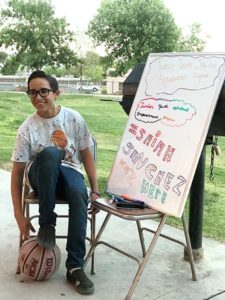
“I asked Baha’u’llah to make this last Fast the most amazing of all Fasts,” she recalls. “And it was.”
It began when Roben Schmidt, a volunteer who helps coordinate Baha’i community building in central Arizona, asked Firmin to move to the Cottonwood/Sedona cluster of communities.
To Schmidt’s surprise, Firmin agreed without hesitation. “She said, ‘What? Really?’ I said, ‘Yes,’ and from then on I felt that I was in a different reality. Every day was full of confirmation and guidance, blessings and gratitude.”
By the end of the Fast and start of the new Baha’i year, Firmin had signed a contract to “buy the house that was everything I wanted and more.” The sale closed in May and the moving began.
To prepare for an active role in her new locality, she engaged in a nine-day study of the Ruhi training sequence at the Bellemont Baha’i Camp near Flagstaff. Next came six days practicing outreach and conversation skills in Phoenix and Tempe.
A further bounty awaited Firmin when, for a summer of service, youth volunteer Ariana Mottahed arranged to live with her in Cottonwood and accompany her in the field.
Settled in, the two began to meet their neighbors with the help of Bill and Roben Schmidt.
“We found the focus neighborhood, and by the end of the June we had the first junior youth group meeting, with expectations of more [junior youths] joining after school starts in August,” says Firmin.
“By the grace of God, we found Grace (the mother) and Isaiah (her son), who really understand the program and are willing to encourage people in the neighborhood to participate. People rally around this family.”
Firmin reflects that “keeping up with the youth, buying a house, selling a house, moving, keeping up with the responsibilities and working” has been a challenge.
Another challenge has been really getting to understand that community building is a long-term process, she says, not just a series of events; “there was a lot for me to detach from, learn and transform.”
Fortunately, Firmin’s team made her “feel totally loved and supported,” and she can say, “This is one of the happiest times of my life. I’m right where I am supposed to be. I’ve already fallen in love with this neighborhood and I look forward to seeing how it will grow.”
“We are intensely engaged”
Tom Howe and his wife, Pohleng Howe Teo, had served the Baha’i Faith in several Asian countries starting in 1995.
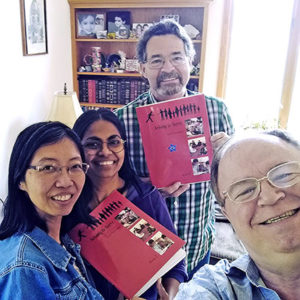
Living in Rochester, New York, they were poised to return to Asia, with nonrefundable airline tickets in hand. Then they received a letter from the Baha’i World Center urging them to consider remaining in the United States and continuing to help build community on the home front.
In quick succession the Howes canceled their plane reservations, consulted with members of Baha’i institutions in the Northeastern States, and moved to Erie, Pennsylvania, to aid promising local efforts.
Since then, says Tom Howe, “We are intensely engaged in youth outreach in a focus neighborhood and with refugee populations.”
To that end the Howes organized a 10-day training session for neighborhood youths — mostly from Asia and Africa — who are looking to mentor elementary and middle-school students.
They also are reaching out to organizations and attending community meetings “to widen our individual network of contacts.”
Many of the Howes’ new friends are part of the Bhutanese Nepali refugee community, says Tom Howe.
“We were really guided to meet the most prominent community leaders almost right away,” he recalls. “We then became true friends with them, meeting for lunches, consulting on refugee community challenges with their own youth, attending Buddhist celebrations and personal funeral prayer meetings in individual homes.”
Such efforts in the neighborhood are “so joyful,” he relates. “What a delightful experience of open and generous cultures. I cannot claim much credit since it is really my wife, Pohleng, who is the driving force and Shreeti, our Nepali student, who has much better skills.”
By joining an interfaith, intercultural group, the couple has also met “religious and community leaders, the city mayor and his staff, thoughtful idealists and social activists,” says Tom Howe.
“This has also opened many doors.”


